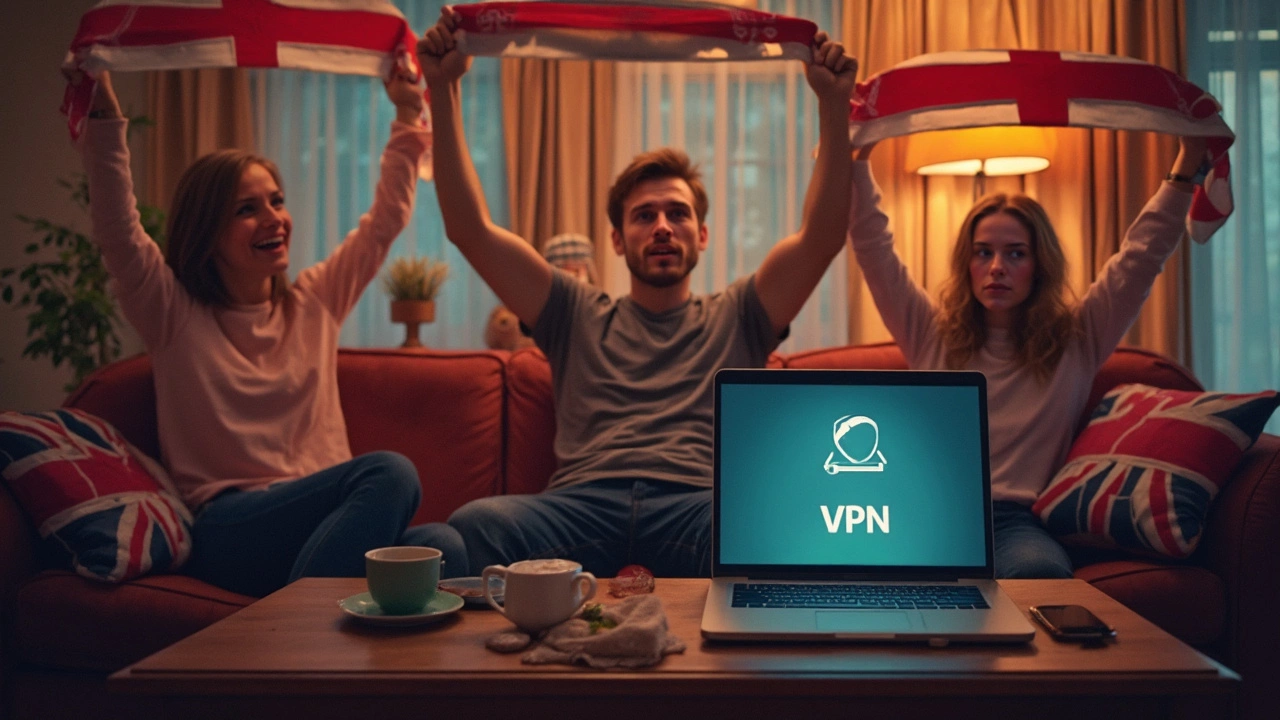How to Watch Rugby Live with a VPN: A Complete 2025 Guide

If you’ve ever tried to stream a big rugby match only to get hit with a "not available in your region" message, you’re not alone. I’ve been there, staring at a black screen while the All Blacks are smashing through another World Cup. Just because you’re traveling, living in a country without broadcast rights, or dealing with those stubborn geo-blocks doesn’t mean you have to miss out. There’s a way to fix it—no sketchy streams, no dodgy pop-ups—just solid rugby, right where you want it: using a VPN.
Virtual Private Networks aren’t just for super spies or people who want to hide in the depths of the internet. Honestly, I first set up a VPN on my old laptop just to watch Callum’s favorite superhero cartoons on UK Netflix while we were on vacation in Spain. The same trick works for rugby, and it takes only a few minutes to set up. The key is how you use it and what you need to look out for—especially if you want that sweet, buffer-free HD and don’t want your account flagged or your connection throttled. If you’re dreaming of watching the Rugby Championship, Six Nations, or the Super Rugby Pacific no matter where you are, you absolutely need to know how this works.
How a VPN Lets You Watch Rugby Anywhere in the World
Let’s break down what’s actually happening when you use a VPN to stream rugby. Streaming sites like ITV, Stan Sport, BBC iPlayer, or NBC Sports have licensing deals that restrict who can watch what, and where. These deals mean you might pay good money for access, but step outside your home country—and suddenly, your screen goes dark. It’s ridiculous. Here’s where a VPN comes in. When you connect to a VPN, you choose a server location. Suppose you want to watch a match airing on ITV Player in the UK, but you’re in the US or France. You just open your VPN, choose a UK server, and bam: websites and streaming services think you’re right there in England, sipping tea, cheering on your favorite team.
The tech behind it is surprisingly simple: your internet traffic gets rerouted through a secure, encrypted tunnel to the server location you pick. So your actual online address (your IP) looks local to those sites. But—and here’s the catch—not all VPNs are up to the job. Many streaming sites fight back, trying to spot and block VPN traffic. If you’re using a free or unreliable VPN, chances are you'll see that classic "You seem to be using a proxy"... and the game is over before it starts. That’s why choosing a good VPN is crucial.
Did you know: In 2024, over 30% of online viewers used VPNs for streaming sports events globally? Rugby is high on that list. Fans from New Zealand to South Africa are using VPNs to catch their teams live. I actually tested five top VPNs for the last Women’s Six Nations, sitting in my living room in Dublin, jumping between S4C in Wales and BBC in London. The right VPN, with high-speed servers and no pesky data limits, made it feel like I had a VIP stadium seat.
What about speeds and privacy? A premium VPN should keep up with HD sport (at least 15 Mbps recommended for HD, the best ones reach much higher), and protect you from throttling. Some internet providers slow down streaming, but with a VPN, they just see encrypted traffic and have no clue what you’re watching. That’s called net neutrality in practice—pretty liberating when you just want rugby in peace.

Step-by-Step: Setting Up a VPN for Rugby Streaming
Okay, onto the practical part. Setting up a VPN is not rocket science, but there are a few steps you don’t want to skip. Let’s make sure you go from missing-out to kick-off-ready fast. Here’s what I do whenever there’s a big match I simply can’t miss:
- Pick the right VPN. Trust me, free VPNs just won’t cut it if you want to actually watch the match, not stutter your way through the second half. A few solid options everyone seems to love are ExpressVPN, NordVPN, and Surfshark. All offer servers in rugby-loving countries like the UK, Australia, and New Zealand. Check for unlimited bandwidth and support for streaming platforms.
- Sign up and download the app. Most of these VPNs have easy apps for Windows, macOS, iOS, Android, even smart TVs and browser extensions. Quick install, no drama.
- Connect to your server of choice. Where is the game streaming? UK server for BBC iPlayer, Australia for Stan Sport, etc. Don’t guess—double check which country’s streaming service has the match.
- Head to the streaming website or app. Now, you just log in as usual. If you don’t have an account, many platforms offer free trials (helpful for big events). Just beware: you might need a local payment method or email. That’s where asking a rugby-mad friend for help can save the day.
- Clear your browser’s cookies. Streaming sites can sometimes sniff out your real location using old cookies. Nuke those before logging in for the cleanest slate.
- Hit play and cheer. If all’s working, you’ll be watching live rugby as if you never left your home couch.
If you hit any hiccups, switching servers or contacting your VPN’s support can fix most problems. I once got blocked mid-game (talk about panic!) but swapping to a different UK server got things running smooth again.
Got kids at home like me? Make sure to set up the VPN on your biggest screen. Rugby is just better when the whole family joins in, snacks everywhere, and you don’t have to squint at someone’s dodgy phone stream.
Here’s a comparison of popular VPNs for rugby fans, with data as of June 2025:
| VPN Provider | Avg. Speed (Mbps) | Server Locations | Unblocks BBC iPlayer | Monthly Price (USD) |
|---|---|---|---|---|
| ExpressVPN | 45 | 105 | Yes | 12.95 |
| NordVPN | 42 | 84 | Yes | 12.99 |
| Surfshark | 39 | 100 | Yes | 10.99 |
| CyberGhost | 33 | 91 | Yes | 12.99 |
| Private Internet Access | 30 | 84 | Yes | 11.99 |
Those prices and speeds are accurate as of late June 2025. Most also offer a 30-day money-back guarantee, so you can test the waters risk-free for your next game.

Secrets to Hassle-Free Rugby Streaming (You Won’t Find on Tech Blogs)
Want pro tips to avoid game-day disasters? Let me spill a few tricks I’ve picked up after dozens of matches, streaming everything from test series to local derbies. First up, always double-check match start times—and adjust for local time zones. Rugby isn’t like football; matches can start early in one hemisphere and late at night in another. My personal disaster: once woke Callum at 6am for a "7pm" Lions match streamed from Auckland. He forgave me only because I made pancakes that morning!
Devices matter, too. If you’re using a smart TV, check if your chosen VPN works natively on the TV, or if you need to install it on your router. Sometimes, casting from mobile or laptop to TV is easier. For iOS and Android, most major VPN apps work smoothly. But don’t download shady APK files—stick to your app store.
While setting up, avoid public Wi-Fi if you can. Sure, coffee shop Wi-Fi might seem convenient, but crowded networks mean extra lag, and you never know who else is snooping. At home, plug into Ethernet or at least snag the 5GHz Wi-Fi band for less buffering. The goal: uninterrupted rugby, no embarrassing "loading" wheels during the final scrum.
Worried about security or privacy? A good VPN doesn’t just get you past geo-blocks, it also keeps your data private. The best VPNs offer a no-logging policy, strong encryption (look for 256-bit AES), and a "kill switch" that cuts connection if the VPN drops, so your real location never leaks. No, you don’t have to sign up with your real name—just use an email, and pay by credit card or even crypto if you’re privacy-obsessed.
Don’t ignore device limits: some VPN plans only allow a handful of devices at once. If you’re inviting friends over, check if your VPN lets you cover a whole house full of rugby fans. Surfshark, for example, boasts unlimited device connections—very handy for big families or watch parties.
Last thing: if you travel with family, a VPN is useful for more than just rugby. I’ve used one in Italy to get British kids’ channels, and Talia loves tuning in to Aussie cartoons from her tablet. Same VPN, more happy faces, and no more arguments over who gets the remote!
Streaming reliability is a moving target. Streaming services occasionally spot and block VPN IPs. If your connection fails mid-match, switch servers, clear cookies, or reconnect the VPN app. Some providers keep fresh servers for streaming fans—ask their support if you’re stuck. Nothing beats watching the All Blacks or Springboks with high-def clarity, no matter what country you’re in.
